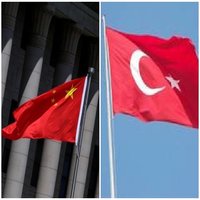Ankara [Turkey]: The ties between Turkey and China have almost become a one-way street as the financial situation of Ankara and Beijing is weakening, and both the countries are looking for business in the Central Asian market in order to achieve an economic turnaround.
As part of its Belt and Road Initiative (BRI) in Turkey, China has completed a key suspension bridge that cut down travel time between Anatolia and the Gallipoli peninsula to just 6 minutes.
At present, the journey takes six hours, which includes an hour-long ferry ride.
President Recep Tayyip Erdogan has inaugurated the 4,608-meter bridge built at Canakkale across Turkey’s Dardanelles Strait that connects the European and Asian shores of the key waterway.
He named the bridge after the 1915 Battle of Canakkale, where the Ottoman Empire fought and successfully defeated British, French and Russian forces during World War-I, as per Policy Research Group.
In fact, the bridge itself is an off-shoot of the 1915 Canakkale Bridge project.
“The Project will integrate the seaports, railways and airways in the Marmara and Aegean regions with highway transportation systems and thus facilitate the economic development and balanced planning and structuring required by the industries in these regions,” CEO Mustafa Tanriverdi said.
Turkish and South Korean contractors built the bridge to facilitate Erdogan’s very own Middle Corridor (MC) Plan, a Silk Road initiative linking China with Europe via railways. Turkey is also keen to extend railways originating from its region into Central Asia to expand its markets.
Turkey became an important part of China’s Belt and Road Initiative (BRI) some seven years ago by signing a Memorandum to connect its Middle Corridor (MC) Plan with the BRI. Under the 2015 deal, China advanced loans for infrastructure ventures and stepped-up investments, particularly in the oil and mining sectors.
On the other hand, China has also constructed a record-breaking suspension bridge within its territory. The cable held Lvzhijiang Bridge connects Yuxi City and the autonomous region of Chuxiong Yi in Yunnan, Policy Research Group reported.
Yunnan is an import gateway in the BRI. President Xi Jinping has called for Yunnan to more actively participate in the BRI, for which it needs to establish better economic connectivity.
Trade between Yunnan and the Association of Southeast Asian Nations (ASEAN) countries accounts for nearly 41 per cent of China’s foreign trade. Laos, Myanmar, Thailand and Vietnam are the major trading partners.
In a mutual interest, Turkey and China are cooperating for reviving the Silk Road trade route.
Notably, Turkey has set its eyes on the Central Asian market to achieve an economic turnaround.
The country has been in the grip of an economic crisis since 2018. Banks and companies have been heavily borrowing from outside Turkey, so much so that Turkey now has the largest current account debts with little to no savings.
While China’s economy has been badly shaken by the COVID-19 range from Taiwan and Hong Kong to the human rights of Uighur Muslims, are also biting.
The ban by the US and other Western countries on the Chinese companies and technologies over privacy issues led to Beijing’s financial situation worsening, Policy Research Group said.
Due to this crisis, the Erdogan government has been pressing China for more investments and financial assets. But China is looking for profitable business, but Turkey has none to offer.
But the Erdogan government did not rally in support of fellow Muslims oppressed in China. It studiously remained silent. This shows that Turkey-China ties have almost become a one-way street with Yuan itself under stress. Even with the opening of the Canakkale Bridge as well. (ANI)




















Comments